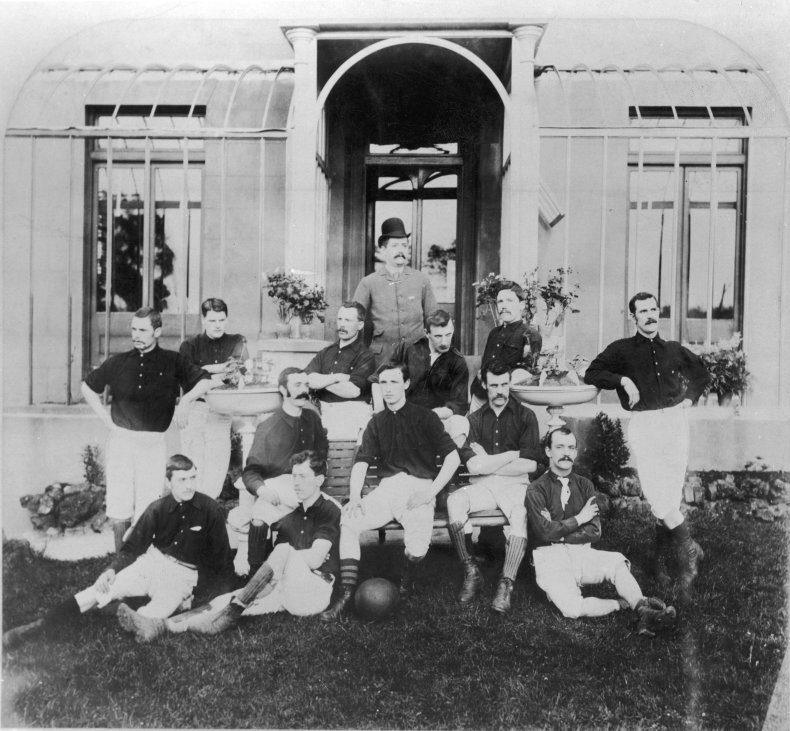While it’s an admittedly fluid concept, there’s something to be said for being “cool.” Brands can sometimes struggle with that concept—we’ve all seen cringe-worthy commercials and social media efforts that don’t quite land—but Arsenal has an advantage. In a world of “United” and “Football Club,” having a one-word noun for a name stands out.
But have you ever wondered where that name came from? And what does an arsenal have to do with soccer?
Well, as usual, history holds the answers. Let’s take a trip to London—and down memory lane—to check it out.
Henry Nicholls/AFP/Getty
The Arsenal name comes from the club’s founding
When you think of a sports team, especially one as big as a Premier League club, it’s easy to think of them as an ever-present force of nature. In reality, though, everyone has to start somewhere.
For Arsenal, that came south of the Thames at the Woolwich Arsenal Armament Factory. In 1886, some of the workers came together to form a football team, which they called “Dial Square” in reference to a sundial atop their place of employment.
That name, however, didn’t last long. As documented on the club’s official website, the team began calling itself “Royal Arsenal.” Eventually, that name evolved to Woolwich Arsenal, paying homage to where it all began.

Hulton Archive/Getty
There was another twist in the tale, though. In 1913, Arsenal famously moved north of the Thames, arriving in the same neighborhood they call home to this day. After that move, the Woolwich was dropped, and the club simply became “Arsenal.”
With that being said, though, there are some other names associated with the club.
‘The’ Arsenal stems from official club documents
In some situations—usually specific chants or dealing with more old-school supporters—you’ll hear reference to “The Arsenal.” And while it’s obvious that phrase is still referring to the same club, have you ever wondered why there’s such an attachment to a single article?
Again, history can explain.
On Angry of Islington, there are preserved images of various documents incorporating the football club as a company. After the Woolwich part of the name was dropped, the name was officially changed to The Arsenal Football Club Limited.
While things evolved over time—the club was officially renamed The Arsenal Football Club Public Limited Company—in the early 1990s, the “The” remained until 2001, when Arsenal Holdings came into the picture.
And while there’s no official explanation for why “The Arsenal” caught on, it does make sense from a sentimental perspective. Every supporter views their club as special; being “The” Arsenal rather than simply Arsenal implies a certain level of individual recognition.
Why is Arsenal called the Gunners?
While Arsenal’s roster no longer consists of workers from a munitions factory, there’s another connection to that heritage. While the club’s crest has evolved over the years, a cannon (or cannons, in early versions) has remained constant.
That visual identity, especially after the crest made its way onto uniforms, has allowed the club to be nicknamed “The Gunners.” And, really, who among us doesn’t like a good nickname?
Is Arsenal the only club that isn’t named after a place?
When you think of European soccer teams, your mind probably jumps to a famous “United” or a club named after a major city. That makes Arsenal and their non-geographical name unique.
The Gunners aren’t alone in that category, though. Within the English pyramid, Port Vale isn’t directly named after a place. While there’s disagreement over whether the name refers to the Port Vale House, where the club was founded, a wharf on the Trent and Mersey Canal, or the collective ports along that same canal, the club doesn’t call Port Vale home.
Outside of England, there are a handful of other clubs, like Juventus, Celtic, Rangers, and Olympiacos, that don’t tie their names to pure geography.


